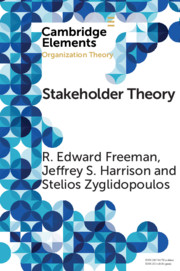Element contents
Stakeholder Theory
Published online by Cambridge University Press: 18 August 2018
Summary
Keywords
- Type
- Element
- Information
- Series: Elements in Organization TheoryOnline ISBN: 9781108539500Publisher: Cambridge University PressPrint publication: 30 August 2018
References
Primary Sources
Secondary Sources
- 95
- Cited by



